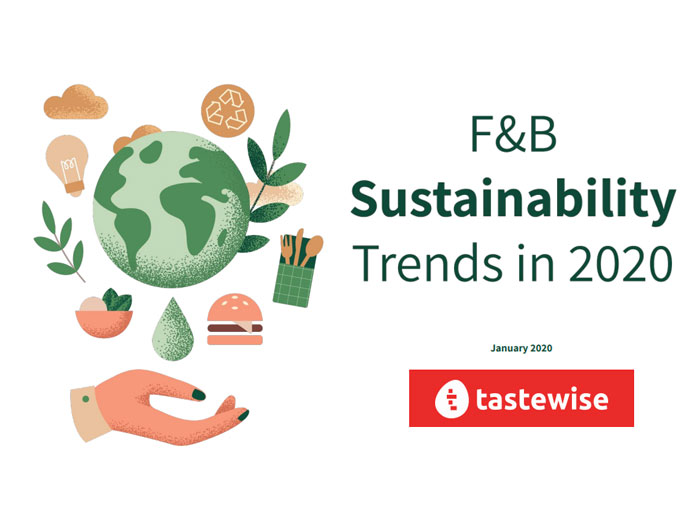Tastewise Reveals Consumer Sustainable Eating Considerations Are on the Rise, but Their Motivations May Surprise You
January 22, 2020 | 3 min to read

TEL AVIV, Israel — Tastewise, an AI-powered food intelligence startup, issues its latest report predicting sustainability trends for the food and beverage industry in 2020.
Plastic straws and packaging are hurting the planet, shopping local can reduce pollution, and meat alternatives are skyrocketing. Sustainability matters for the health of the planet, but what does it mean to consumers? Tastewise leverages real-time insights of consumers’ motivations and preferences to help companies advance products and practices to meet the needs of today’s sustainability trends and anticipate emerging food trends.
Analyzing over 2B social interactions, more than 3M online recipes, and the largest restaurant menu database available of 274K restaurants, the latest report from Tastewise forecasts industry changes in sustainability for the coming decade. The study discloses 23% more consumers prioritize sustainable food choices today than a year ago. Furthermore, the data-driven approach examines why.
For example, consumers’ eco-motivations and health needs eclipse all other factors when it comes to sustainable food, propelling the growing popularity of dark chocolate and cocoa beans.
Other highlights from the report include:
- While 39% of consumers’ sustainable conversations focus on health benefits, only 1% discuss animal rights, disproportionally to its impact on environment sustainability
- Meatless conversations are on the rise, with vegan diet proving most popular
- California leads the way in sustainability; with only 12% of US population, it’s home to 22% of sustainable restaurants
- Keto dieters are seeking suitable, sustainable meat options, while some are ready to avoid animal products altogether
- Seafood is taking over sustainable recipes, with pollock dominating sustainable seafood menus, and oysters rising fastest in discussions
- Juice and smoothie bars that promote sustainable packaging are benefiting from increased consumer excitement
- Healthy waffles and oats are on track to win the restaurant scene
“Sustainability is an issue that’s increasingly important across food categories and markets, and we’re excited to offer data that impacts the future of our industry,” said Alon Chen, Tastewise Co-Founder and CEO. “We are helping our clients on a daily basis to find the right sustainable solutions that meet their consumer needs of today, as well as tomorrow. If a menu or a product doesn’t offer sustainable seafood, it’s time to catch up to consumers’ heightened culinary consciousness.”
The full Tastewise 2020 Food and Beverage Sustainability Trends report can be downloaded here.
About Tastewise
Founded in 2017 by former Google executive, Alon Chen, and technology engineer, Eyal Gaon, Tastewise brings the power of data to the art of food and beverage intelligence. The Tastewise platform analyzes billions of data points, including social media, menus, and home recipes, to provide real-time insights for restaurants, hospitality groups, and food brands. Capturing food innovation in real time, Tastewise equips industry professionals to identify target segments and competitors, understand emerging trends, and determine which dishes or products should be served next. Tastewise leverages machine learning to tap into the culinary consciousness that drives the world’s freshest food and beverage insights. The Israel-based FoodTech company is backed by $6.5 million in funding, led by Pico Partners and PeakBridge Partners, Ltd., and counts many top food brands among its customers, including Nestlé, Coca-Cola Company, Sensient Technologies, International Flavors & Fragrances, and Campbell Soup Company. For more information, please visit www.tastewise.io, like us on Facebook @Tastewiseai, follow us on Twitter @Tastewiseai, Instagram @tastewise.ai, and LinkedIn @tastewise.
